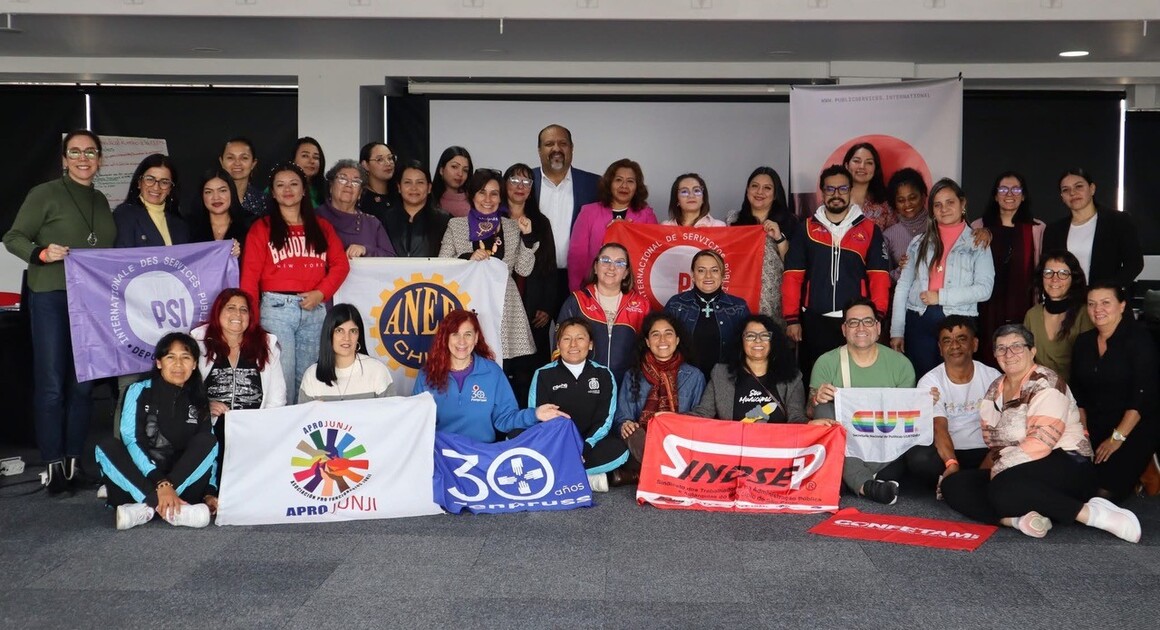Regional Meeting Interamerican child care workers demand labor recognition

Early childhood care workers organized by PSI affiliates in Inter-America reaffirmed once again that social care, and in particular child care, must cease to be invisible and precarious and become a fundamental pillar of public social care systems.

Nayareth Quevedo Millán
At a crucial moment for the Latin American trade union movement, unions affiliated to Public Services International (PSI) reaffirmed once again that social care, and in particular child care, must cease to be invisible and precarious and become a fundamental pillar of public social care systems. This was expressed by early childhood care workers gathered on July 28 and 29 in Bogotá during the Regional Meeting on Child Care: Towards Public Systems of Social Care for Early Childhood, which was held thanks to the sponsorship of the FORSA and SASK projects.
The event, which brought together almost 40 trade unionists from the sector from Chile, Mexico, Brazil, Ecuador, Bolivia and Colombia, marked a turning point in PSI's regional strategy: it not only made visible the urgency to act, but also consolidated a political consensus among its affiliates in the region to move towards the creation of a new sector within PSI such as Social Care, with child care as the structuring axis.
In the words of Susana Barría, regional head of care in Inter-America and PSI sub-regional secretary for the Andean countries: "We are not just talking about working conditions, we are talking about the model of society we want. And without a public care system that dignifies caregivers and guarantees rights from childhood, no social justice is possible".
The centrality of care work: from the private to the political sphere
The voice of the protagonists was the guiding thread of a meeting that was not limited to denunciation. It was a space for identity affirmation, political construction and regional articulation. As one participant from Ecuador expressed: "We care with love, but not for love should we accept precariousness". Testimonies such as these, charged with emotion and truth, brought to the table a structural demand: that care work should cease to be treated as a private or family matter, and be recognized as an essential public service, with state funding, decent working conditions and full exercise of rights.
During the first day, experts such as Valentina Contreras (GI-ESCR) gave a perspective of care and support as a social right and public good, which served as a prelude to the spaces for reflection aimed at the "Collective construction of common principles of a trade union agenda to improve working conditions in the sector". The issues discussed were as diverse as they were urgent: informality, outsourcing, low wages, overwork, gender violence and lack of state regulation. But clear proposals also emerged: professionalization of the sector, job stability, continuous training, organization of child care workers and public care policies with a rights-based approach.
The most reiterated demand was transversal and unanimous: to recognize care work as a structural part of public systems, and thus ensure that caregivers have access to all labor rights. A Colombian worker was categorical: "The state has to assume its responsibility. We cannot continue to support with our own backs a task that benefits society as a whole.
From diagnosis to action: a roadmap for structural transformation
The second day delved into the possible ways to advance in this transformation. Experts such as Valentina Parrotta (CLACSO) and Juana Barragán (GI-ESCR) provided technical and legal foundations to strengthen trade union demands. National and international regulatory frameworks, financing policies and public governance mechanisms were discussed. The recent consultation before the Inter-American Court of Human Rights -which recognizes care as a human right- was presented as a fundamental tool for regional advocacy.
The climax of the meeting was the participatory workshop where participants outlined a regional agenda for trade union action, with clear priorities: strengthening the organization of care workers, promoting the unionization of the sector, articulating national and regional networks, and demanding that States create comprehensive, universal and progressively funded public care systems.
A Chilean delegate summed up the spirit of the meeting clearly: "We are leaving with a collective mandate. We are not only going to pressure our governments. We are going to build together a continental movement of care workers".
This was not a closing, but a beginning. In addition to Barría, the sub-regional secretaries of the Southern Cone and Central America, Mexico and the Dominican Republic, Nayareth Quevedo and Claudia Sule, pledged to support this road map, taking up the challenge expressed by the affiliates to promote the formation of a social care sector capable of articulating struggles, consolidating gains and advancing in the structural transformation of the care model.